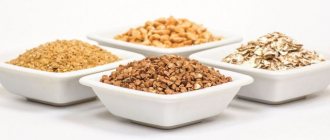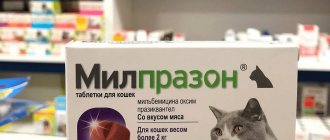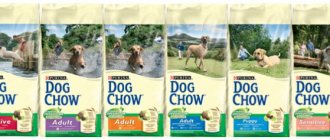- 14.01.2017
- Animals, Pet health, Dogs, Articles, Explanatory
Few owners of four-legged pets have not once thought about whether their dog needs to salt their food . There are situations when an animal, eating a certain way, suddenly refuses some of its usual dishes and shows with all its appearance “it doesn’t taste good to me,” although it happily waits for the treasured piece of dry-cured sausage or cheese to arrive from the owner’s dining table. Is it worth torturing an animal and waiting until it gets really hungry and begins to gobble up everything in the bowl with gusto? Or is it enough to add a little salt to bland porridge or a piece of meat so that your pet stops neglecting bland breakfasts?
Is it possible to give a dog salt: advice from veterinarians
In general, there are several theories as to whether it is necessary to salt your dog's food or not. As for industrial feed, which is sold in the form of canned food, everything is clear here. Manufacturers themselves made sure that the food contained sodium and chlorine ions. Usually a small amount of salt is added in production. Accordingly, such food does not need additional salt.
Can I give my dog salt?
- If the question concerns natural nutrition, when the dog’s diet includes meat, fish, and cereals that are prepared independently, then the situation here is different.
- In most cases, experts argue that a lack of sodium, as well as chlorine in the body at a young age, leads to deterioration in skeletal growth and acute disorders.
- Sodium is a trace element that is involved in the formation of bone tissue and skeletal cartilage, usually occurring before the age of one year.
- Accordingly, during this period it is still necessary to introduce a small amount of salt so that the dog has enough of it.
Doggie
What salt to use
Most often, when preparing food for a dog, owners choose table salt. It contains chlorine and sodium, which are necessary to maintain the health of your pet. Sea salt has beneficial properties. Compared to table food, it contains more beneficial microelements that are necessary for the dog’s health.
Important! If iodized salt is used, it is important to control its dosage when adding. Dogs suffering from thyroid diseases should not add it to their food.
There is another type - extra, consisting of small crystals. It is boiled down and contains fewer nutrients, so adding it to food is pointless.
Should dogs eat salt?
If the dog is old enough, then it is necessary to consider all options and evaluate what the dog eats. If it is raw, fresh meat, then it is not necessary to add salt. Fresh meat mainly contains blood; it contains sodium chloride in a small concentration. This is usually the saline solution that makes up dog and human blood. Accordingly, part of the sodium chloride enters the pet’s body along with the blood. This also applies to offal.
Should dogs eat salt?
- It is necessary to evaluate how often the dog eats from the owner's table. This refers to how often the pet gets a variety of goodies, such as herring, cheese, or a piece of dry-cured, smoked sausage.
- The fact is that these products contain a huge amount of salt, so 1-2 pieces a whole day for a dog will be enough to compensate for the deficiency of sodium chloride.
- Remember that such products spoil the dog’s stomach and intestines, so it is necessary to treat your dog with them very rarely. Sometimes it is recommended to give hard cheese; it also contains a large amount of sodium chlorine.
Treating the dog
Required amount
The daily requirement for each animal is individual and it consists of the parameters of growth, age and body condition.
For a large pet, for example, if it is a Rottweiler, the daily norm is 1.7 g, and for small breeds - about 0.2 g. However, adding salt is required only if the diet does not contain products that contain this component, for example, sausages, sausages.
High salt content is detrimental to your pet's health
Should dogs salt their food when cooking?
If you treat your dog to foods from the refrigerator, semi-finished products, and processed meat products, then there is no need to salt the food you prepare.
Should dogs salt their food when cooking?
- If, nevertheless, the dog is on a natural diet, but there is very little fresh meat in the diet, mainly boiled porridge, bone broths, and soups, then it is necessary to introduce salt, but in small quantities.
- It should be about 3 times less than for yourself. That is, salt is necessary, but in much smaller quantities. Please note that salt is white death, and indeed the consequences of an overdose for a dog are much worse than for a person.
- If we can afford to regularly consume large amounts of salt and not observe chronic diseases of the bladder and kidneys for a long period of time, then in dogs the disease develops and progresses much faster.
Water
Induce vomiting
Regular table salt can be used as an emergency remedy if your dog has eaten something wrong. In order to induce vomiting, open the dog's mouth, fix the tongue and place half a teaspoon of salt at the very root of it.
As a rule, the reaction will follow immediately. There is no need to be afraid that the situation will only get worse: during nausea, the dog’s pylorus closes and the absorption of toxic substances stops.
Reference! Vomiting can also be caused by a solution of potassium permanganate or copious gastric lavage.
Salt poisoning in dogs
It is enough just to overfeed him with salty food a few times, the reaction will not take long. In most cases, very serious problems arise with the functioning of the kidneys and bladder.
Salt poisoning in dogs:
- Stones may appear in them, or fluid loss may worsen, with the formation of edema. Please note that if you do add a little salt to your food, be sure to take care of a bowl of water. There should be a lot of it, since after taking salt the dog can become dry. It is imperative that it replenishes the fluid deficiency.
- Remember, if you give your dog fermented milk products, that is, kefir, cottage cheese and cheese, then there is no need to add additional salt. Many radicals say that wild dogs are relatives of dogs and wolves, do not consume salt and live long lives.
- In fact, the body of domestic dogs is significantly different from wild dogs, but wild animals also receive salt. It is found in large quantities in the blood. Since the main diet of wild animals is small living organisms, mainly rodents and rabbits, their blood contains sodium chlorine. It is the basis of all fluids in the body.
Dogs
Symptoms of salt poisoning: what to do
According to statistics, 8 out of 10 dogs die from salt poisoning, and most often the owner is to blame. This is why it is so important to understand why dogs should not have salt, and also in what cases it can be added.
Salt poisoning can be identified by symptoms such as:
- sudden mood swings;
- refusal to eat;
- tremor;
- convulsions;
- dyspnea;
- unsteady gait;
- the desire to rest your head against a corner.
Important! If the owner detects at least one of the symptoms, this is a reason to immediately contact a veterinarian. An experienced doctor will tell you whether it is possible to add salt to dogs’ food and how to do it correctly, as well as what foods are allowed.
Before the veterinarian arrives, it is necessary to provide the animal with constant access to drinking water. If the animal cannot drink on its own, deep and abundant enemas through the mouth will be required. When the condition stabilizes, the veterinarian will prescribe a course for the dog, in which the pet will need to be given boiled starch jelly from flax seeds.
Salt poisoning requires veterinary assistance
Can dogs salt their food on a natural diet?
Another thing is that a pet cannot consume raw meat every day; not all dog breeders have the means to purchase such products. If this is meat sold on an industrial scale in stores, then in most cases it contains salt.
Can dogs salt their food on a natural diet?
- Many sellers soak meat in salt water to increase its weight. Accordingly, there is no need to introduce additional salt in this case. If the meat was bought secondhand from a farmer you know, then it is necessary to add salt to such food.
- Let us give an example: in all Soviet nurseries, dogs were fed with the introduction of salt. When preparing food, it was added in an amount of half of the norm that people administer to themselves. All dogs grew up healthy and strong.
- Accordingly, a small amount of salt is still acceptable. Under no circumstances add enough salt to yourself. Introduce sodium chloride in small amounts so that it is barely noticeable in taste.
Cutlets for dogs
Daily dose
Salt is a natural flavor enhancer that is initially present in many products. Many dogs, accustomed to salty food from birth, subsequently refuse salt-free dishes, which forces them to add additional salt to their food. This most often leads to an overabundance of the substance, which has an extremely bad effect on the functioning of all internal organs and systems.
Scientists believe that the daily dose for an adult healthy dog is 0.0001 g per 15 kg of weight. At home, it is almost impossible to accurately measure the required amount. Therefore, veterinarians advise that if you salt food, it should be done so that a person cannot feel the taste.
Most veterinarians give one answer: there is no need to add a flavor enhancer if the animal eats natural food. It is enough to introduce salt-containing foods into your diet every day:
- Raw meat.
- Raw lard.
- Kefir.
- Buckwheat.
- Cottage cheese.
- Parsley.
If you avoid these products or feed salt-free dry food, then to ensure that your pet receives the required dose, it is enough to give a piece of pickled cucumber or sausage once a week.
Should dogs' food be salted when cooking?
Many people believe that a dog should also taste food, and without salt it is completely tasteless. In fact, a dog's taste buds are different from human ones; they are less sensitive.
Do dogs need to salt their food when cooking?
- If you add more or less salt, the dog is more likely to not understand. Therefore, salt in this case is added only as a way to introduce nutritional components such as sodium and chlorine.
- Chlorine is a harmful chemical element, but it is involved in all processes in the human and dog body. With its help, hydrochloric acid is formed in the stomach. Therefore, without this component there may be problems with digestion.
- Sodium whole blood kidneys chlorine brains skin light whole blood kidneys and liver.
With a pet
What are the dangers of using the product for animals?
Everything is good in moderation; if a pet receives too much salt for a long time, an excess of it occurs in the body. This may cause the following consequences:
- Fluid accumulation. The function of maintaining water balance is disrupted, too much water accumulates in the tissues, swelling and bloating occur.
- For these reasons, the blood thickens, which disrupts the functioning of the cardiovascular system. Over time, due to heavy stress, the cells of the organ will begin to destroy, heart failure, shortness of breath, and changes in pulse will appear.
- An increase in water in the body leads to an increase in blood pressure; it also affects the functioning of the heart and the vascular system as a whole.
- The work of the hypothalamus (the area in the diencephalon responsible for the integration of nerve impulses from various systems) decreases.
- The risk of osteoporosis increases (the body loses too much calcium).
- Accumulated salt interferes with the functioning of the kidneys, leading to the formation of stones.
A large dose of sodium chloride can lead to salt poisoning. A pet is unlikely to eat a large amount of the product on its own, but adding it to food is dangerous for the animal’s life. Rapid dehydration leads to disruption of most internal organs. For a dog, the lethal dose is 3-4 grams. substances per kilogram of weight.
Should I salt my dog's food every day?
If every day some salty food is included in the dog’s diet, then there is no need to introduce additional salt. This rule only applies if offal and meat are given raw, that is, not boiled.
Should you salt your dog's food or not?
- Many fans of natural nutrition claim that wild breeds did not consume salt. Many note that the dogs that guarded the sheep were constantly with the shepherds, receiving practically no food.
- Almost everything they ate was of natural origin. These are small animals and insects. Often shepherds fed their assistants with cakes dipped in whey. Accordingly, salt was present in large quantities in such food.
- If the dog is factory fed, then there is no need to add salt. If you are feeding your dog treats from the table, you do not need to add additional salt to the food you are preparing. If you strictly monitor your dog’s diet and don’t give anything even as a reward from your table, then you need to add salt only in a small amount, about 3 times less than you add to yourself.
meal
How do you know if there is too much salt?
Salt retains and absorbs water, that is, a dog whose tissues have accumulated sodium will drink a lot . The pet will feel thirsty regardless of the air temperature. The natural consequence is increased urination. The color of the urine will be lighter than usual. The changes occur because the dog's kidneys work faster, trying to eliminate as much salt as possible in a short time.
Should I add salt to my dog's food: reviews
If you additionally give your dog vitamins prescribed by the veterinarian, there is no need to introduce salt. Typically, chlorine, as well as sodium, are contained in vitamin preparations in the required quantities. Below you can read reviews from dog owners.
Should I add salt to my dog's food? Reviews:
Eugene . I have a German Shepherd, so I cook my own food. I don’t buy food, I don’t think it’s of the highest quality. I don’t salt my food, since my girl’s diet often includes a large amount of raw meat. I think that my dog feels great; it is not necessary to introduce salt.
Elena, owner of the Pekingese . I buy food for my dog and very rarely give him treats from the table, such as cheese and sausage. I try not to overuse it, since once my Zhuzha got poisoned from such food. I don’t salt my food, I feed it mostly with food.
Alexey, owner of a husky . When I got a dog, I had no idea that a large number of questions and problems would arise. Initially, we kept the dog on food, but then the financial situation worsened, now we cook on our own. We often introduce raw meat. I add a little salt to my food. I add a very small pinch, 3 times less than for myself. The dog is healthy.
Puppies
As you can see, responsibility for the health of pets lies with their owners. Everyone decides for themselves whether the dog needs to be given salt or not. Veterinarians and specialists have not come to a consensus regarding the addition of salt to a dog’s diet.
Benefit
To answer this question, it is worth turning to history and statistics. In veterinary practice, there have been cases where dogs hopelessly ill with rickets were saved by adding regular salt to the diet. So how does it work and what benefits does the product provide?
The chemical composition of salt has the simple formula NaCl (sodium chlorine), where:
- Sodium – participates in the body’s metabolic processes, promoting better absorption of amino acids and calcium. Prevents problems with the musculoskeletal system.
- Chlorine – along with potassium, chlorine is responsible for the functioning of the nervous system, regulating inhibition processes. Prevents seizures and heart rhythm disturbances.
Reference! Chlorine is part of gastric juice and is involved in protein processing processes.
Are there any health benefits for dogs from pickled cucumbers?
Pickles are generally less healthy than raw cucumbers.
The nutritional value of pickles can vary greatly, as much depends on the cucumber, when it was pickled, how it was pickled, and what it was pickled with. A “medium” marinade contains only 4 calories, making it a low-calorie snack. It has some sugar and carbohydrates, some fiber and some protein. It is also high in vitamins A and K. However, cucumber is mostly water.
It has a lot of salt, 283 mg per brine. This is about 20% of the recommended daily value for a person! For dogs this is also a large amount. Most veterinarians do not recommend that your dog exceed 100 mg of sodium per day, so one marinade is three times that amount.
Some people believe that fermented pickles (and keep in mind that not all pickles are fermented) have certain health benefits. This is because the bacteria that cause fermentation are known as probiotics in humans.
However, there is no evidence that this benefits dogs at all, and it is likely that with their different digestion it will not have the same effect.
Some people also claim that the vinegar contained in pickles has health benefits. This is likely due to the claimed benefits of apple cider vinegar. However, pickle vinegar is white vinegar and has no known health benefits.
Many cucumbers are pickled in dill. Dill is supposed to have health benefits, including high levels of vitamins C and B6, and is also a good source of calcium. However, feeding your dog pickles is not an effective way to get them these vitamins and minerals—it's much better to use fresh herbs, which have a higher nutritional value.
What types of pickles are suitable for dogs?
The safest foods for your dog to eat are regular pickles, pickles, or kosher pickles. They should not be fed pickled onions, pickled garlic, pickled peppers or certain spices, so it is safest to stay away from flavorings and spices. Most people recommend sweet pickles because they have less salt and are therefore less dangerous.
Your dog will get the same health benefits from cucumber, but with much less risk, which is why cucumber is the best snack for dogs. Other great vegetables that make the best snack include diced sweet potatoes or diced bell peppers as a workout reward.











